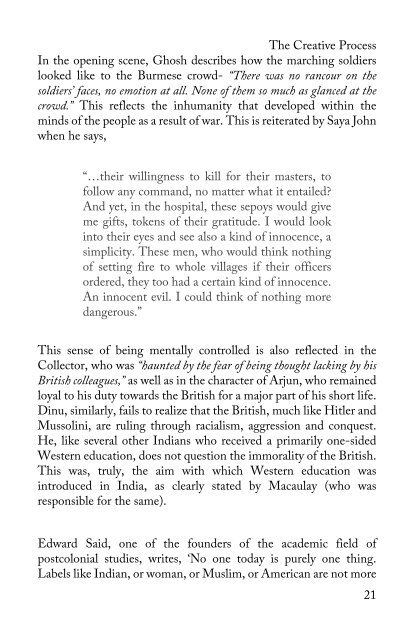The Creative Process: The Arts of War (Spring 2017)
The Creative Process is The Mumbai Art Collective's flagship magazine.
The Creative Process is The Mumbai Art Collective's flagship magazine.
You also want an ePaper? Increase the reach of your titles
YUMPU automatically turns print PDFs into web optimized ePapers that Google loves.
<strong>The</strong> <strong>Creative</strong> <strong>Process</strong><br />
In the opening scene, Ghosh describes how the marching soldiers<br />
looked like to the Burmese crowd- “<strong>The</strong>re was no rancour on the<br />
soldiers’ faces, no emotion at all. None <strong>of</strong> them so much as glanced at the<br />
crowd.” This reflects the inhumanity that developed within the<br />
minds <strong>of</strong> the people as a result <strong>of</strong> war. This is reiterated by Saya John<br />
when he says,<br />
“…their willingness to kill for their masters, to<br />
follow any command, no matter what it entailed?<br />
And yet, in the hospital, these sepoys would give<br />
me gifts, tokens <strong>of</strong> their gratitude. I would look<br />
into their eyes and see also a kind <strong>of</strong> innocence, a<br />
simplicity. <strong>The</strong>se men, who would think nothing<br />
<strong>of</strong> setting fire to whole villages if their <strong>of</strong>ficers<br />
ordered, they too had a certain kind <strong>of</strong> innocence.<br />
An innocent evil. I could think <strong>of</strong> nothing more<br />
dangerous.”<br />
This sense <strong>of</strong> being mentally controlled is also reflected in the<br />
Collector, who was “haunted by the fear <strong>of</strong> being thought lacking by his<br />
British colleagues,” as well as in the character <strong>of</strong> Arjun, who remained<br />
loyal to his duty towards the British for a major part <strong>of</strong> his short life.<br />
Dinu, similarly, fails to realize that the British, much like Hitler and<br />
Mussolini, are ruling through racialism, aggression and conquest.<br />
He, like several other Indians who received a primarily one-sided<br />
Western education, does not question the immorality <strong>of</strong> the British.<br />
This was, truly, the aim with which Western education was<br />
introduced in India, as clearly stated by Macaulay (who was<br />
responsible for the same).<br />
Edward Said, one <strong>of</strong> the founders <strong>of</strong> the academic field <strong>of</strong><br />
postcolonial studies, writes, ‘No one today is purely one thing.<br />
Labels like Indian, or woman, or Muslim, or American are not more<br />
21



